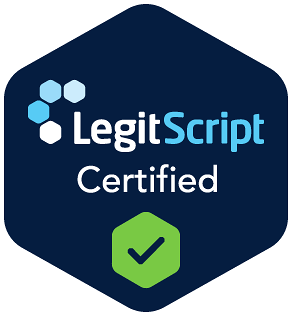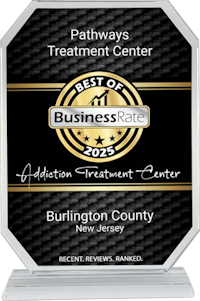Motivational Interviewing for Substance Abuse in Burlington, New Jersey
Recovery from substance abuse often feels overwhelming, especially when uncertainty and doubt take over. Many people want to change but struggle with fear, guilt, or lack of confidence.
Motivational Interviewing (MI) provides gentle guidance that helps people recognize their strengths and believe change is possible. It creates an open space where individuals can explore choices without pressure or judgment.
At Pathways Treatment Center, we use this approach to encourage self-discovery and meaningful progress. Our compassionate team walks alongside each person, helping them uncover their own reasons for recovery.
Motivational Interviewing for Substance Abuse
What Is Motivational Interviewing?
Motivational interviewing for substance abuse is a counseling method created to help people find their own reasons to make healthy changes. It is often used in substance abuse treatment because many people feel torn between wanting to quit and wanting to keep using. Rather than confronting or lecturing, this approach focuses on guiding people to talk openly about their struggles and hopes.
MI for substance abuse is especially helpful when someone feels stuck between wanting to change and fearing change. This ambivalence is very common in recovery. People often know the risks of substance use but also feel comforted by old habits. MI works best when someone is not fully ready but still curious about the possibility of change. It is also effective when other approaches have failed because it lowers defensiveness and builds trust. By meeting people where they are, MI helps recovery begin with honesty and hope.
The goal is to build inner motivation by weighing the rewards of change against the impact of staying the same. This method is built on collaboration, meaning the counselor and client work together instead of following a one-sided plan. It has been shown to be effective for people at different stages of readiness, from those unsure about quitting to those preparing for recovery. Because it respects choice and control, many people feel less pressured and more willing to commit to lasting change.
Motivational Interviewing for Substance Abuse
How Motivational Interviewing Works in Addiction Treatment
Motivational interviewing for substance abuse works by helping people explore both sides of their struggle—the desire to change and the pull to keep using. This ambivalence is normal in recovery, and the approach gives people space to talk about it without fear of judgment. Instead of telling someone what to do, the counselor asks open-ended questions and listens closely, reflecting back what they hear. This creates clarity and helps individuals hear their own reasons for change in a supportive way.
For example, someone might say, “I hate how drinking affects my family, but I don’t know how to stop.” A counselor might respond, “You care deeply about your family, and you also feel unsure about the next step.” This reflection acknowledges the conflict while affirming the person’s values. Over time, these conversations reduce resistance and build motivation that comes from within, rather than pressure from outside.
Some people struggle with what is known as treatment-resistant addiction. This means that standard programs or tough-love approaches have not worked. In these cases, pressure can make resistance even stronger. MI offers a different path by avoiding confrontation and focusing on personal choice. Counselors use patience, reflection, and empathy to help people see their own reasons for change. This softens resistance over time and creates space for progress, even when past treatments felt overwhelming or unhelpful.
MI can be effective on its own, especially for people at the early stages of recovery who feel uncertain. However, it often works best when combined with other treatments, such as counseling, group therapy, or medical support. By encouraging openness and self-awareness, MI prepares people to engage more fully in the rest of their recovery plan.
Motivational Interviewing for Substance Abuse
Empowering Change Through Motivational Interviewing
Empowerment in recovery means helping people realize that change is not only possible but also within their own control. MI builds that confidence by paying more attention to what’s working than what isn’t. Instead of dwelling on what went wrong, it highlights the skills and values a person already carries. This shift builds confidence, which is often missing when substance abuse has taken over someone’s life.
For those struggling with addiction, feeling powerless is a common barriear. MI turns that around by reinforcing self-worth and personal choice. Each conversation strengthens the idea that recovery is not about living up to someone else’s expectations—it is about reclaiming a life that matters. When people see themselves as capable decision-makers, they are more likely to follow through with addiction treatment and sustain long-term recovery.
Motivational Interviewing for Substance Abuse
Benefits of Motivational Interviewing for Substance Abuse
Recovery is not only about stopping substance use; it is also about building the belief that change is possible. MI helps people develop that belief by focusing on their strengths and guiding them toward their own reasons for recovery. Instead of pushing or lecturing, MI creates an open space where progress feels personal and self-driven. This approach is especially powerful because it supports both the emotional and practical sides of change.
- Reduces Resistance: MI lowers defensiveness by replacing confrontation with understanding, which makes people more open to change.
- Clarifies Ambivalence: Conversations help clients sort through mixed feelings, making their motivations clearer and more concrete.
- Builds Confidence: By highlighting strengths and past successes, MI increases self-belief and readiness to try again.
- Encourages Personal Responsibility: Clients design their own recovery steps, making them more committed to following through.
- Improves Engagement in Treatment: Respectful collaboration strengthens trust, which makes people more likely to stay involved in therapy.
- Supports Long-Term Change: Motivation that comes from within is more likely to last after treatment ends.
- Reduces Relapse Risk: MI prepares people for challenges by exploring triggers and building coping strategies early.
- Integrates with Other Therapies: It works alongside medical care, counseling, or group programs, enhancing overall recovery outcomes.
- Strengthens the Counselor-Client Relationship: The cooperative nature of MI deepens trust, which is vital for recovery progress.
- Adaptable to Different Stages of Recovery: Whether someone is hesitant or already in treatment, MI adjusts to meet their needs.
Together, these benefits show why motivational interviewing for substance abuse is widely used in treatment settings. The strength of MI lies in its ability to meet people where they are, reduce resistance, and guide them toward lasting recovery. Its practical benefits also connect directly to its structure. The four processes of MI and the core skills of OARS explain how these outcomes are achieved, step by step.
Motivational Interviewing for Substance Abuse
The Four Processes of Motivational Interviewing
MI follows four key processes that guide every conversation. Each stage builds on the last, helping people move from uncertainty to action in a way that feels safe and empowering.
The first step is building a genuine connection between the counselor and client. Trust is essential because people are more likely to share openly when they feel respected. Engaging creates a safe space where judgment is replaced with empathy. This step lays the foundation for everything that follows by showing that the counselor is a partner, not an authority figure.
Once trust is built, the next step is clarifying what matters most to the client. Instead of pushing an agenda, the counselor helps the person identify their goals and priorities. This could mean talking about family, health, or personal values. Focusing ensures the conversation stays centered on what the client truly cares about, making motivation feel personal and meaningful.
Evoking is where change talk begins to surface. The counselor encourages the client to explore their reasons for wanting change, even if they are small. Through open questions and reflections, people begin to hear their own motivations spoken aloud. This process turns vague hopes into clear, powerful reasons for recovery that come from within, not from outside pressure.
The final process is creating a plan that feels realistic and achievable. Instead of setting rigid rules, the counselor helps the client design steps that match their readiness. The first steps may feel small, but together they create steady progress. Planning transforms motivation into action, giving people a roadmap they feel confident about following.


Motivational Interviewing for Substance Abuse
OARS: The Core Communication Skills of Motivational Interviewing
MI relies on a set of communication skills often remembered by the acronym OARS. These abilities are key to building a connection, honing in on a goal, bringing out a person’s own reasons for change, and making a plan. By using OARS, counselors guide conversations that are supportive, easy to understand, and give you back your confidence.
We like to ask questions that encourage you to share more about your experience in your own words, and open up space for even deeper conversation. This skill supports Engaging by showing genuine curiosity about the person’s story. It also fuels Evoking because clients start uncovering their own reasons for change as they speak.
Affirmations highlight a person’s strengths, values, or past successes. They build confidence and remind clients of what they already bring to the recovery journey. Affirmations directly support Evoking by reinforcing self-belief and also strengthen Planning because people feel capable of taking the next step.
Reflective listening means carefully repeating or rephrasing what a client says to show understanding. This skill reduces defensiveness and makes people feel truly heard. It plays a vital role in Engaging and Focusing, because it clarifies goals while deepening trust between counselor and client.
Summarizing ties together key points from the conversation. It helps clients hear their own progress and see the bigger picture. This skill strengthens Planning by organizing next steps and ensuring that motivation feels clear and structured. Summarizing also reassures clients that their words matter and have been understood.
Motivational Interviewing for Substance Abuse
Motivational Interviewing at Pathways Treatment Center
At Pathways Treatment Center, we provide motivational interviewing for substance abuse with a clear, supportive process that empowers clients. Our approach focuses on trust, collaboration, and helping each person uncover their own motivation for lasting recovery. We follow a structured path so that clients always know what to expect and feel supported at every stage of the journey.
It all begins with making a space where a person feels secure and accepted without judgment. Our counselors listen carefully and respect each client’s story without criticism. This foundation of trust allows people to open up and feel understood, which is essential for change.
Many clients feel torn between the comfort of old habits and the hope of recovery. We guide them through this uncertainty by discussing both sides honestly. These conversations help reduce confusion and make the benefits of change easier to see.
MI on your strengths and what’s already working well for you, not what isn’t. Our counselors point out each person’s values, resilience, and past achievements. This builds confidence and shows that recovery is possible with the strengths they already have.
We help clients identify small, achievable steps that move them closer to recovery. Counselors ask open, thought-provoking questions to help someone look within and find their own path forward. Because the plan comes from the client, it feels authentic and achievable.
Recovery does not end when treatment does. We work with clients to prepare for challenges, like stress or cravings, by creating coping strategies. This planning helps reduce relapse risk and keeps motivation strong in the long term.
Our support continues even after formal treatment ends. We provide follow-ups, counseling, and encouragement to help clients stay on track. This ongoing connection gives them confidence and a sense of community throughout recovery.

Motivational Interviewing for Substance Abuse
Start the Conversation: Take the First Step Toward Change
Taking the first step toward recovery can feel intimidating, but you do not have to do it alone. MI begins with a simple conversation, one that focuses on your story, your goals, and your hopes for change. At Pathways Treatment Center, we make that first step approachable by offering a safe and supportive space where you can talk openly without judgment.
Choosing Pathways means working with a team that listens first and guides with compassion. Our counselors are trained in motivational interviewing for substance abuse and understand how to help people who feel uncertain about recovery. We combine evidence-based methods with genuine care so that each person feels empowered, not pressured.
Getting started is straightforward. You can contact us by phone, email, or our website to arrange a private consultation. From there, we will walk alongside you, helping you explore your options and build a plan that feels right for you.
Change starts with a single conversation. If you are ready to take that step, contact Pathways Treatment Center today. Let us help you find the motivation, strength, and support you need to begin your recovery journey.



